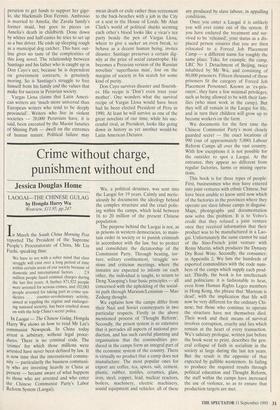Crime without charge, punishment without end
Jessica Douglas Home
LAOGAI—THE CHINESE GULAG by Hongda Harry Wu Wesiview, £11.95, pp.247
In March the South China Morning Post reported The President of the Supreme People's Procuratorate of China, Mr Liu Fuzhi, speaking thus: We have to see with a sober mind that class struggle will exist over a long period of time within certain areas of our society because of domestic and international factors ... 2.9 million people faced criminal charges during the last five years. A further 871,922 people were arrested for serious crimes, and 102,083 people arrested for taking part in crime syn- dicates . .. counter-revolutionary activity, aimed at toppling the regime and endanger- ing national security, has been cracked down on with the help China's secret police.
In Laogai — The Chinese Gulag, Hongda Harry Wu shows us how to read Mr Liu's communist Newspeak. In China today arrest is arbitrary, without legal proce- dures. There is no criminal code. The `crimes' for which those millions were arrested have never been defined by law. It is now time that the international commu- nity — particularily the business communi- ty who are investing heavily in China at present — became aware of what happens to those who are arrested and who enter the Chinese Communist Party's Labor Reform System (Laogai).
Wu, a political detainee, was sent into the Laogai for 19 years. Calmly and metic- ulously he documents the ideology behind the complex structure and the cruel polic- ing within the camps, which hold between 16 to 20 million of the present Chinese population.
The purpose behind the Laogai is not, as in prisons in western democracies, to main- tain order in society or to punish criminals in accordance with the law, but to protect and consolidate the dictatorship of the Communist Party. Through beating, tor- ture, solitary confinement, 'struggle' ses- sions and criticism meetings, where the inmates are expected to inform on each other, the individual is taught, to return to Deng Xiaoping's four basic principles — all concerned with the upholding of the social- ist path through Marxism/Leninism — Mao Zedung thought.
Wu explains how the camps differ from their Nazi and Soviet counterparts in two particular respects. Firstly in the above mentioned process of 'Thought Reform'. Secondly, the prison system is so extensive that it pervades all aspects of national pro- duction, and has such careful planning and organisation that the commodities pro- duced in the camps form an integral part of the economic system of the country. There is virtually no product that a camp does not manufacture. The most popular ones for export are coffee, tea, spices, salt, cement, plastic, rubber, textiles, ceramics, glass, iron, steel, copper, lead, nuclear reactors, boilers, machinery, electric machinery, sound equipment and vehicles: all of these are produced by slave labour, in appalling conditions.
Once you enter a Laogai it is unlikely you will ever come out of the system. If you have endured the treatment and sur- vived to be 'released', your status as a dis- placed person ensures that you are then relocated to a Forced Job Placement Camp — a different name for roughly the same place. Take, for example, the camp, LRC No 1 Detachment of Beijing, twice inhabited by Mr Wu, and consisting of 80,000 prisoners. Fifteen thousand of these prisoners fit the category of Forced Job Placement Personnel. Known as 'ex-pris- oners', they have a few minimal privileges, such as being allowed to be with their fam- ilies (who must work in the camp). But they will all remain in the Laogai for life, and in turn their children will grow up to become workers on the farm.
Wu documents for the first time the Chinese Communist Party's most closely guarded secret — the exact locations of 990 (out of approximately 5,000) Labour Reform Camps all over the vast country.
With few exceptions it is not possible for the outsider to spot a Laogai. At the entrance, they appear no different from regular factories, farms or mining opera- tions.
This book is for three types of people: First, businessmen who may have entered into joint ventures with ethnic Chinese, but have been unable to know until now which of the factories in the provinces where they operate are slave labour camps in disguise.
Maps, photographs and documentation now solve this problem. It is to Volvo's credit that they refused a joint venture once they received information that their product was to be manufactured in a Lao- gai. Unfortunately the same cannot be said of the Sino-French joint venture with Remy Martin, which produces the Dynasty Dry Rosé Wine. Secondly, the consumer: in Appendix 2, Wu lists the hundreds of exported commodities with the code num- bers of the camps which supply each prod- uct. Thirdly, the book is for intellectuals and politicians: it is fashionable to hear, even from Human Rights Legco members in Hong Kong, the phrase that 'Marxism is dead', with the implication that life will now be very different for the ordinary Chi- nese; but those who continue to operate the structure have not themselves died. Their work and their means of survival involves corruption, cruelty and lies which remain at the heart of every transaction. Wu's salutary prologue, written just before the book went to print, describes the gen- eral collapse of faith in socialism in the society at large during the last ten years.
But the result is the opposite of that expected by gullible westerners. In failing to produce the required results through political education and Thought Reform, the staff within the camps have increased the use of violence, so as to ensure that production targets are met.


















































 Previous page
Previous page